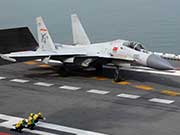

SEOUL, Nov. 1 -- Chinese Premier Li Keqiang on Sunday urged Japan to properly handle and manage sensitive issues in bilateral ties and called for concerted efforts to maintain and strengthen the positive momentum in the rapprochement between China and Japan.
Citing the recent rough patch of China-Japan interaction, Li said during talks with Japanese Prime Minister Shinzo Abe that the two countries both know the causes and should summarize the past and draw lessons from it.
Historical issues closely relate to the political foundation of China-Japan ties and the national sentiment of 1.3 billion Chinese people, Li said, expressing the hope that Japan can be fully aware of the high sensitivity of the issues and will honor its commitment by facing up to and reflecting on history.
The talks, held at the request of the Japanese side, came after the two leaders joined South Korean President Park Geun-hye at the first China-Japan-South Korea summit in three and a half years.
China-Japan relations, which suffered traumatizing blows in 2012 and 2013 due to Japanese provocations on territorial and historical issues, have witnessed gradual recovery since the two countries reached a four-point principled agreement in November last year, which paved the way for an ice-breaking meeting between Chinese President Xi Jinping and Abe days later.
China and Japan need to properly handle the sensitive issues in bilateral political relations under the spirit of looking at history squarely and taking history as a mirror, and keep a firm grasp on the overall development of their strategic relationship of mutual benefit, the premier added.
He also hoped the Japanese side should adopt a positive China policy and meet with China half way, so as to improve bilateral ties continuously.
Now bilateral security dialogue and exchanges between the two countries' governments, legislatures and political parties have resumed, and high-level contact has also been picking up steam.
Furthermore, Li called on China and Japan to cultivate mutual trust.
He urged the two countries to stick to the path of peaceful development, and put into practice the principle of defining each other as cooperative partners that pose no threat to one another and supporting each other's peaceful development, which is specified in their fourth political documents.
Li also urged Japan to respect the concerns of its Asian neighbors in the field of security and contribute more to the peace and stability of the region.
Both sides, Li said, should also deepen their pragmatic exchanges and cooperation and enhance communication over their macro-economic policies so as to cope with challenges together, given the backdrop of the weak recovery of global economy.
For his part, Abe said Japan and China shoulder the responsibility of promoting regional peace and stability and boosting the development of world economy.
He said he is willing to further improve and develop his country's ties with China based on the four political documents signed by the two countries.
Japan will continue to pursue peaceful development based on its reflection of the WWII, and adhere to the defensive defense policy, Abe said.
Meanwhile, he said Japan is willing to further boost cooperation with China in such areas as finance, energy conservation and environmental protection.
China urges Japan to properly handle sensitive issues in bilateral ties
English.news.cn 2015-11-01 23:10:22
SEOUL, Nov. 1 (Xinhua) -- Chinese Premier Li Keqiang on Sunday urged Japan to properly handle and manage sensitive issues in bilateral ties and called for concerted efforts to maintain and strengthen the positive momentum in the rapprochement between China and Japan.
Citing the recent rough patch of China-Japan interaction, Li said during talks with Japanese Prime Minister Shinzo Abe that the two countries both know the causes and should summarize the past and draw lessons from it.
Historical issues closely relate to the political foundation of China-Japan ties and the national sentiment of 1.3 billion Chinese people, Li said, expressing the hope that Japan can be fully aware of the high sensitivity of the issues and will honor its commitment by facing up to and reflecting on history.
The talks, held at the request of the Japanese side, came after the two leaders joined South Korean President Park Geun-hye at the first China-Japan-South Korea summit in three and a half years.
China-Japan relations, which suffered traumatizing blows in 2012 and 2013 due to Japanese provocations on territorial and historical issues, have witnessed gradual recovery since the two countries reached a four-point principled agreement in November last year, which paved the way for an ice-breaking meeting between Chinese President Xi Jinping and Abe days later.
China and Japan need to properly handle the sensitive issues in bilateral political relations under the spirit of looking at history squarely and taking history as a mirror, and keep a firm grasp on the overall development of their strategic relationship of mutual benefit, the premier added.
He also hoped the Japanese side should adopt a positive China policy and meet with China half way, so as to improve bilateral ties continuously.
Now bilateral security dialogue and exchanges between the two countries' governments, legislatures and political parties have resumed, and high-level contact has also been picking up steam.
Furthermore, Li called on China and Japan to cultivate mutual trust.
He urged the two countries to stick to the path of peaceful development, and put into practice the principle of defining each other as cooperative partners that pose no threat to one another and supporting each other's peaceful development, which is specified in their fourth political documents.
Li also urged Japan to respect the concerns of its Asian neighbors in the field of security and contribute more to the peace and stability of the region.
Both sides, Li said, should also deepen their pragmatic exchanges and cooperation and enhance communication over their macro-economic policies so as to cope with challenges together, given the backdrop of the weak recovery of global economy.
For his part, Abe said Japan and China shoulder the responsibility of promoting regional peace and stability and boosting the development of world economy.
He said he is willing to further improve and develop his country's ties with China based on the four political documents signed by the two countries.
Japan will continue to pursue peaceful development based on its reflection of the WWII, and adhere to the defensive defense policy, Abe said.
Meanwhile, he said Japan is willing to further boost cooperation with China in such areas as finance, energy conservation and environmental protection.
 |
Day|Week

 World's most heart-pounding bridges
World's most heart-pounding bridges First Glass Suspension Bridge in China Opens to Visitors
First Glass Suspension Bridge in China Opens to Visitors The world famous machine guns
The world famous machine guns
 In pics: J-15 Carrier-Based Fighter takes off from Liaoning aircraft carrier
In pics: J-15 Carrier-Based Fighter takes off from Liaoning aircraft carrier In pics: army beauties across world
In pics: army beauties across world Air stewardesses packed into overhead bin
Air stewardesses packed into overhead bin China enters Go Away, Mr. Tumor for 88th Oscars
China enters Go Away, Mr. Tumor for 88th Oscars Highlights of the National Day holiday
Highlights of the National Day holiday Chinese peacekeeping forces in South Sudan encounter armed conflicts
Chinese peacekeeping forces in South Sudan encounter armed conflicts "Luxury" art apples debut in Shanghai
"Luxury" art apples debut in Shanghai